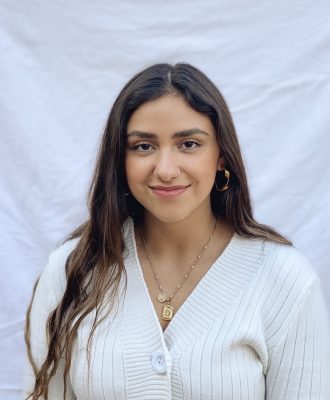Q&A with Christina Perez, MPH candidate in Global Health

Christina Perez
What was your background before enrolling in the MPH program?
Before enrolling at Gilling, I attended California State University San Marcos where I majored in Psychology and minored in Global Studies with a focus on international law and human rights. For two years, pre- and post-graduation, I also worked as a research assistant in a Cultural Perinatal Mental Health Laboratory. The study researched the links between sociocultural stressors and risk for adverse mental health outcomes during pregnancy and postpartum among women of Mexican descent and their infants. My work on the project furthered my passion in working on projects that focus on improving health quality and access among vulnerable populations which is what ultimately led me to global health.
Can you tell us about your position as a Graduate Research Assistant at UNC Chapel Hill’s School of Nursing?
Muévete con Apoyo (Move with Support) is a research project that aims to assess the feasibility and acceptability of a culturally sensitive dyadic physical activity intervention for Latinos with osteoarthritis and a member of their social network. Within the project, I work as the recruitment, retention, and evaluation specialist. As the main point of contact, I oversee various aspects of the project in order to ensure participants progress through the intervention smoothly as well as evaluate their experiences post-intervention. Working within the Muévete con Apoyo team, I have gained really valuable experience conducting qualitative research and implementing a culturally adapted theory-based intervention.
Can you tell us more about your summer practicum?
I worked for the DIAL-3D (Devices for Increased Adherence to ART with Long-Acting Applications using 3D printing) research project within UNC School of Medicine, Department of Biomedical Engineering. The project, which is a new study in reproductive health, aims to evaluate user sensory perceptions and experiences in women for prototype intravaginal ring (IVR) designs which are devised to both prevent HIV and provide contraception. My main roles were in supported the projects efforts for Hispanic/Latinx recruitment, conducting in-depth interviews, and running qualitative data analysis to inform device product design. Often times recruitment of minority women into research is left unprioritized or can be difficult, especially when language barriers are present. The DIAL-3D team deeply values equitable research, and I had the privilege of working alongside greatly experienced public health researchers and contribute to their mission.
What does “global health” mean to you?
Global health, in my opinion, is a combined endeavor among diverse bodies and people working toward common health goals across disciplines and borders. It is the promotion of health equity through deep inclusion of/collaboration with communities of focus in order to reach sustainable and culturally appropriate solutions.
What drew you to the Gillings School of Global Public Health?
A few years ago, while I was still an undergrad, I attended a conference to present my research. After poster presentations were done, I remember walking around collecting graduate program brochures from all the university booths. Eventually I ended up speaking to a Gillings School of Global Public Health representative about my interests and the various programs. Needless to say, once I returned home, I went straight into researching the program/concentrations and was completely drawn in by Gillings’ global focus, collaborative efforts, and diverse work. Even years before applying to grad school, I knew that Gillings was going to be my top choice.
What is your dream job?
This is a tough question and one that I’m not sure I entirely know the answer to just yet! I know that I want my future career/job to be focused on implementing programs for maternal and child health populations globally. Particularly within the areas of maternal access to care among immigrant and displaced populations as well as sexual and reproductive health. I would love to be able to work for a governmental, NGO, or non-profit organization conducting community-based participatory research within this field globally.
What is your favorite flower and why?
I actually have two favorite flowers, daffodils and marigolds. Apparently, certain flowers represent months, such as daffodil to March and marigold to October. Both my parents were born in March and my grandmother was born in October. I’ve never been big on having bouquets of flowers, but whenever I see these two, I love being reminded of some of my favorite people!
